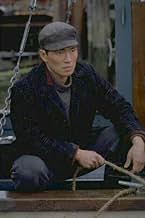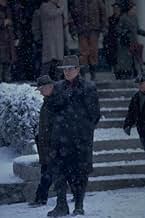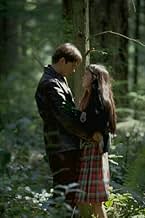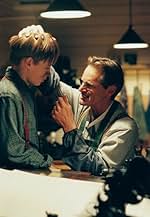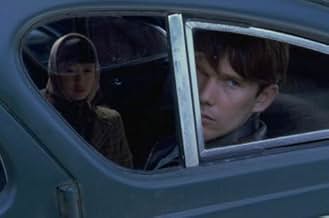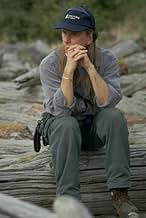Lors du procès dans lequel un Japonais est accusé du meurtre d'un pêcheur, le journaliste chargé de couvrir le procès découvre que la femme de l'accusé était le grand amour de sa jeunesse av... Tout lireLors du procès dans lequel un Japonais est accusé du meurtre d'un pêcheur, le journaliste chargé de couvrir le procès découvre que la femme de l'accusé était le grand amour de sa jeunesse avant qu'elle ne connaisse la déportation.Lors du procès dans lequel un Japonais est accusé du meurtre d'un pêcheur, le journaliste chargé de couvrir le procès découvre que la femme de l'accusé était le grand amour de sa jeunesse avant qu'elle ne connaisse la déportation.
- Réalisation
- Scénario
- Casting principal
- Nommé pour 1 Oscar
- 5 victoires et 11 nominations au total
- Nels Gudmundsson
- (as Max Von Sydow)
- Hatsue Miyamoto
- (as Youki Kudoh)
- Carl Heine Sr.
- (as Daniel Von Bargen)
Avis à la une
GOOD NEWS - On the first look, I was totally blown away and dazzled at the fabulous cinematography. Man, this is one of the prettiest movies I've ever seen.....and that's important for my entertainment. Scene after scene looks like some picture postcard. I also enjoyed the two lawyers in this film, played by James Rebhorn and Max VonSydow. Sometimes those two were riveting to watch.
BAD NEWS - Most of the story was anything but riveting, way too slow and with way too much time used on flashbacks. This story could have been told in a much more presentable way which could have kept the audience's attention. It's also a little too politically-correct. We were beaten over the head with the prejudice against Japanese. Everyone here, except the Liberal newspaper editor and his son, is portrayed as extremely bigoted.
Overall, a spectacular visual film - one of the best ever - but a story that takes interminably long to tell.....too long.
Nominated for best cinematography, this film deserved to give American Beauty a better run for its money. Sadly savaged by many critics, who seemed to fail to grasp the depth of the story and the beauty with which it was told because they were too busy analyzing the parts. Snow Falling on Cedars follows a mixed race love that is complicated by the onset of war. The reactions of the two principle characters betrays not only how human love can transcend itself into something greater but how those involved can find fulfillment in themselves through its sacrifice. The exquisite symbolism (you could write a book on the different things snow could symbolize after watching this) is never overplayed - in other words, the viewer can enjoy the film as entertainment without having "deeper meanings" rammed down their throat - but they are there in abundance, from the way the scenery is developed to small details such as the main character's name ("Ishmael" - meaning "He whom God hears").
Set in 1950, the film chronicles the effect a mysterious death of a local fisherman has on the populous of a small island community made up mostly of whites and Japanese Americans, a death that, for complicated reasons, awakens many of the racial prejudices still holding over from the recently concluded war. As a Japanese man stands trial for the `murder,' Ishmael Chambers (Ethan Hawke), a mediocre reporter for the local paper, copes with three basic issues: his unrequited love for the defendant's Japanese wife, the flaring-up of anti-Japanese bigotry in both the past and the present, and haunting memories of his deceased father, a socially crusading newspaper publisher, in whose shadow Ishmael toils and against whose professional reputation Ishmael is tested and found wanting.
The film is definitely at its most emotionally powerful in its superb middle section, which beautifully dramatizes, in flashback, the shameful deportation of these Japanese-American citizens to interment camps in California, for no crime more serious than simply being of Japanese descent. Parallels to the rounding up of Jews in Nazi Germany are never far from our minds as we witness this wholesale forced migration of a group of innocent people singled-out to assuage the prejudice and fear of an ignorant but powerful majority. For these scenes alone, the film is most assuredly worth seeing.
Unfortunately, the rest of the film cannot sustain this same intensity of deep emotional conviction. The forbidden interracial childhood romance between Ishmael and Hatsue, the current wife of the man on trial, smacks a bit too much of tired Romeo and Juliet melodramatics. Furthermore, Ishmael seems underdeveloped as a character, too dreamy-eyed and passive, just the kind of character that can be easily swallowed up in a film in which the background plays such a prominent part. Moreover, the easy wrap-up of the trial is woefully unconvincing and unsatisfying both as realism and as drama.
On the positive side, `Snow Falling on Cedars' boasts a fascinating dual-level structure, in which small snippets of information are introduced to us in the form of near-subliminal quick cuts representing memories or speculations on past events, often, oddly, those at which none of the characters involved in the current scene were even present. This latter inconsistency in the film's point-of-view may seem dubious and questionable from a strictly narrative standpoint, but the format does help to flesh out the story and characters in interesting and intriguing ways, intensifying the mystery as we attempt to piece it all together to finally get a view of the whole picture. Director Scott Hicks, along with his co-writer Ron Bass, succeeds in providing a richly detailed glimpse into a shameful episode in American history - and the lyrical quality achieved through Robert Richardson's outstanding cinematography helps the film override some of its more obvious flaws. If one brings an attitude of patience and a fine eye for natural beauty to the film, `Snow Falling on Cedars' turns out to be quite rewarding, especially for those misguided misfits who still, at this late date, justify and defend the actions taken against the American Japanese during the war. This film is a stunning rebuttal to both them and their idiotic notions. For that aspect alone, `Snow Falling on Cedars' demands to be seen.
There were really three stories intricately interwoven into one. The main story was the trial of a Japanese American for the murder of a fisherman who owned the land wrongfully taken from the accused's father. The other two stories provide insight into critical events affecting the trial. The first involves the childhood love affair of local newspaperman Ishmael (Ethan Hawke) and Hatsue (Youki Kudoh), who is now the wife of the accused. He has uncovered information that can aid the defense, but his resentment for having been jilted by Hatsue stands in the way of his bringing it forth.
The second ancillary story is the persecution of Japanese Americans and Japanese immigrants during World War II. We see depictions of hatred and bigotry, as law abiding Japanese citizens are shamelessly herded into internment camps. This seething animus serves as the psychological backdrop for the trial, which occurs in the early 1950's when the memories of the war and lost loved ones is still fresh.
From a directorial and cinematography perspective, this film was nothing short of a masterpiece. It is a cinematic work of art. Between Hicks' brilliant camera perspectives and Robert Richardson's beautiful lighting and earth tone coloring, the film was resplendent in powerful and stirring images. Many were so artistically done that if made into snapshots they could easily hang in any art gallery. Each shot was meticulously thought out. Many involved complex shots through windows, silhouette backlighting, elaborate blocking, and scenes where actors, props and camera were all moving in different directions to create fabulously fluid perspective shots that slowly unfolded to revealed the scene's full content.
The editing was also fantastic. I have seen comparison's between this editing and The Limey'. While there is some similarity in technique, this was far more elegant and flowing, whereas `The Limey' was jumpy and disconnected. This style of editing was absolutely necessary to adhere to the book's non linear format. Hicks needed to insert scenes that explained the feelings and motivations of the characters, and the only way to do this was with flashbacks and jump cuts. Despite the fact that such editing is disconcerting to a large majority of viewers, it was an artistic decision that was exactly right for the story, and seamlessly done. The same is true of the audio overlays with monologues of characters superimposed on one another, giving great power and emphasis to certain of the characters' lines.
The story itself, with all of its components, was engaging and well crafted. Unfortunately, there was not enough time to develop more of the characters. The scenes depicting the herding of the Japanese out of their homes for relocation were chilling. The courtroom scenes were realistic, not forsaking court procedure for dramatic effect, as is so common nowadays. The love scenes were sensitive, romantic and passionate without the need for sexual explicitness.
From an acting perspective, this was more of an ensemble production. All the actors gave wonderful performances, especially Youki Kudoh, who was torn between her love for Ishmael and her loyalty to her family and traditions. Kudoh was so emotionally involved with the part that she actually began crying during the featurette when recalling one of the scenes. Screen legend Max von Sydow was also fantastic as the aging defense attorney fighting and pleading for justice amidst the racial hatred.
This is a beautifully crafted film with a compelling story. It is a filmmaking 10/10. It has unfortunately not found a wide audience since its strongest elements are not areas of mass appeal. For the refined viewer who can appreciate filmmaking as an art, and enjoy an intriguing but deliberate story with exquisitely woven subtleties, this film is a delight. For those who prefer Hollywood's movie success formula of fast paced linear stories with lots of violence, profanity, clever one liners and raunchy sex, this film will bore them to death.
It's a small town in the State of Washington; the ninth anniversary of the attack on Pearl Harbor is coming up, and a young man named Kazuo Miyamoto (Rick Yune), a much decorated American soldier during the war, is on trial for the murder of local fisherman Carl Heine (Eric Thal). Covering the trial is reporter Ishmael Chambers (Ethan Hawke), whose father, Arthur (Sam Shepard), had been a respected newspaperman locally for many years, known as a man who was not afraid to speak from his conscience when writing an editorial, and who took a stand for the Japanese locals during the emotionally exasperating years encompassing World War II.
Attempting to objectively cover Kazuo's trial, Ishmael finds himself troubled by a conflict of interests; he has a history with Kazuo's wife, Hatsue (Youki Kudoh), a former relationship reaching back to their childhood, but which ended with the onset of the war. And Ishmael still is grappling with the bitterness he has felt since that time, born of his experiences in the military, as well as Hatsue's rejection of him. And now he is forced to objectively observe this pivotal point in her life, watching from the sidelines and seeing first hand the effects of the prejudice that is very much alive among the local citizenry, and which threatens the assurance of an impartial judgment in Kazuo's case; a judgment that will determine the future of not only Kazuo, but of Hatsue, the woman Ishmael once loved-- and still does.
Working from an intelligent screenplay (by Hicks and Ronald Bass, adapted from the novel by David Guterson), with this film Hicks demonstrates the difference between a visionary filmmaker and someone who just makes movies. In another's hands, because of the story itself, this would have no doubt been an excellent film; with Hicks directing, however, it becomes something much more, as he has taken it beyond excellent, crafting and delivering a film that is thoroughly mesmerizing, majestic and memorable. It's an accomplishment achieved through a visionary presentation, born of the director's sensitive approach to the material and his acute insights into the human condition. Fully utilizing all of the magic at his disposal, Hicks has taken a good film and turned it into an emotionally involving, inspirational and visually poetic experience.
With a haunting score by James Newton Howard underscoring the magnificent cinematography of Robert Richardson, Hicks brings the era and the rural splendor of Washington State vividly to life, creating an aesthetic ambiance that makes the emotional essence of the drama almost tangible; and by exacting some incredible performances from his actors, he sustains that emotional level and combines all of these elements to make this film riveting and unforgettable.
As Ishmael, Ethan Hawke gives a reserved, understated performance, through which he genuinely captures the essence of his character. Watching him, you can sense the turmoil of a soul at cross purposes with itself, and he enables you to sample that taste of bitterness toward life he so desperately needs to overcome if he is to move on within himself to greener pastures. With this role, Hawke was given the opportunity to do something fine, and he succeeds with one of his most memorable performances yet.
Youki Kudoh turns in an extremely affecting performance, as well, as Hatsue. With this moving portrayal of a young woman enduring unbearable inner turmoil, she fulfills the artistic promises made in previous films, such as `Mystery Train' in '89, and `Picture Bride,' in 1965. She's a terrific actor, whose eyes are truly a window to her soul.
Also adding to the success of this film are the supporting efforts of Richard Jenkins, as Sheriff Moran, and James Rebhorn as prosecutor Alvin Hooks. But the most notable performance of all comes from Max von Sydow, who as Kazuo's defense attorney, Nels Gudmundsson, is given an opportunity to return to the kind of role that shaped his career early on under the auspices of Ingmar Bergman. As Nels, von Sydow gives a performance made all the more powerful by the restraint and subtlety of his delivery. He takes what to most actors would be a good part, and makes it a cohesive element of the film. It's a performance that by all rights should have earned von Sydow an Oscar nomination, but sadly did not.
The supporting cast includes Reeve Carney (Young Ishmael), Ann Suzuki (Young Hatsue), James Cromwell (Judge Fielding), Ariia Bareikis (Susan Marie), Celia Weston (Etta) and Daniel von Bargen (Carl). In a year (1999) that saw lesser efforts acknowledged, `Snow Falling On Cedars' was inexplicably ignored at Oscar time (except for Richardson's most deserving nomination for cinematography); an injustice, to say the least, as this was clearly one of the best films of the year. Reminiscent of Ang Lee's artistry, yet with a style uniquely his own, Hicks has given us a poetic film of rare beauty and conscience, for which he is hereby granted an Award in it's purest form:
The gratitude of an appreciate audience. 10/10.
Le saviez-vous
- AnecdotesWhen the Japanese-Americans are sent to internment camps, many of the extras were Japanese-Americans who had actually been sent to the camps in the 1940s.
- GaffesJapanese guests wear black ties at the wedding. They should be wearing white ties. In Japan, black ties are for funerals.
- Citations
Nels Gudmundsson: It takes a rare thing, a turning point, to free oneself from any obsession. Be it prejudice or hate, or, even love.
- Crédits fousJan Rubes and Sheila Moore are on the credits despite their scenes being deleted.
- Bandes originalesMoon over Burma
Written by Friedrich Hollaender (as Frederick Hollander), Frank Loesser
Performed by Dorothy Lamour
Courtesy of the RCA Records Label of BMG Entertainment
Meilleurs choix
- How long is Snow Falling on Cedars?Alimenté par Alexa
Détails
Box-office
- Budget
- 35 000 000 $US (estimé)
- Montant brut aux États-Unis et au Canada
- 14 417 593 $US
- Week-end de sortie aux États-Unis et au Canada
- 32 135 $US
- 26 déc. 1999
- Montant brut mondial
- 23 049 593 $US
- Durée2 heures 7 minutes
- Couleur
- Mixage
- Rapport de forme
- 2.39 : 1


